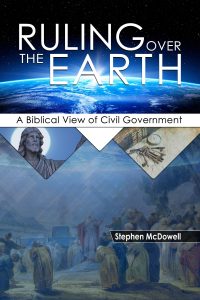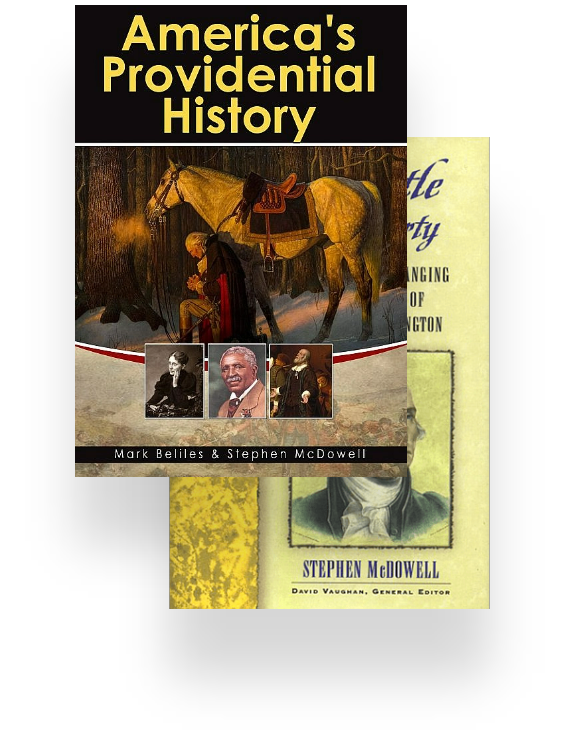PF UNIVERSITY

By Stephen McDowell
This article is an excerpt from the book “Ruling Over the Earth, A Biblical View of Civil Government” by Stephen McDowell. Order a copy here.

What is the biblical perspective on the size of civil government? While some Christians argue for big government, the weight of biblical and historical evidence supports limited government.
Civil government is a divine institution with an important function, but it is to be limited. The power it exercises should only be enough to enable it to fulfill its biblical purpose. Any more and it becomes oppressive and tyrannical. Civil government should not usurp the authority of God or the other divine institutions He established.
Jesus taught that we are to render to God the things that are God’s, which is an argument for limited government. The concept of Christian self-government is another strong point supporting limited government because the size of civil government declines as self-government increases (and self-government increases where the Gospel is implanted in the culture). Government is not to control individual conscience. It is not to hinder biblical worship, morality, or action. History shows that centralized power leads to loss of Christian liberty in all spheres of life (religious, political, economic, and civil). That God desires men to live free is another support for small government.
Private property rights are a strong argument for limited government. God created man as His steward (delegated ruler) over the earth (Gen. 1:26-30; Ps. 8:6-8; 1 Cor. 6:3). Man has authority and freedom to manage all the resources God has given him to fulfill his calling (Mt. 25:14-18, 27; Lk. 19:13, 23). The larger the state becomes, the less private property individuals possess (through state ownership and control, as well as increased taxes) and, hence, they have less ability to fulfill the Creation Mandate.
Most arguments for big government involve usurpation of authority, where civil government assumes the responsibilities for charity and other works that the Bible says belong to other institutions.
Government performs a negative, rather than positive, role in society; that is, it punishes men when they violate God’s standard of moral behavior (as summarized in the Ten Commandments[i]). This negative role helps limit its power and authority. It protects citizens as they pursue the acquisition of property and knowledge, and maintenance of health and life. It is not to provide property, education, health, or welfare. Acting in a positive way increases its power and in turn diminishes our liberties.
The Bible is full of examples of abusive governments and leaders. Perhaps the best known example is Pharaoh, who refused to release the children of Israel from bondage, even when threatened with God’s judgments. The plagues were attempts to change the mind of the totalitarian Egyptian leader so he would act in accordance with God’s will. Passover is a celebration of God’s work to deliver His people from a bad civil ruler.
With this oppressive example of a monarchial form of government in everyone’s mind, Moses, via God’s instruction, established a constitutional republic with an executive whose powers were limited and checked by the other elected leaders. Unfortunately, God’s people rejected His plan for limited government and asked for a king. They tried to do so with Gideon (Judges 8:23), who rebuffed their efforts, but did succeed when Samuel’s sons began to govern (1 Sam. 8).
The book of Samuel chapter 8 reveals why the Israelites instituted kings contrary to God’s wishes. When Samuel the Judge (Chief Magistrate) was old he appointed his sons as judges over Israel (v. 1). That they were corrupt, unjust, and did not follow God’s law was one reason the people asked Samuel for a king (v.3). They also wanted to be like all the other nations who had monarchies (v. 5, 20). In addition, they had grown tired of governing themselves and fighting their battles (v. 20), and so a lack of self-government contributed to the establishment of royal rulers.
Both Samuel and the Lord were displeased with the people’s request, God declaring that their action indicated they were rejecting Him as their ultimate leader (v. 6-7). God allowed them to set up kings (“I gave you a king in My anger,” Hos. 13:11), but He told Samuel to warn them of the grave consequences of a pagan top-down form of government:
This will be the procedure of the king who will reign over you; he will take your sons …. He will take your daughters.… He will take the best of your fields…. He will take a tenth of your seed…. He will also take your … best young men … for his work…. He will take a tenth of your flocks, and you yourselves will become his servants.” (1 Sam. 8:10-18)
Tyrannical governments will take from man what God wants man to have. The consequence of government taking what does not belong to it is enslavement of the people in the nation. If government controls all property it controls all life. It thus robs humans of expressing the image of God and living in the great liberty that God intended for man from the beginning. Statism turns a nation into a giant prison.
Statism is the belief that civil government or the state is the ultimate authority. Statism has many forms: socialism, communism, fascism, democratic socialism, etc. Statism, in essence, elevates man as god, which is the original sin of Adam and Eve. In eating of the tree of the knowledge of good and evil, Adam and Eve declared they would determine for themselves what was good and evil instead of following God’s declaration (Gen. 3:5). Man has ever since worshiped himself, but it is via corporate man – i.e. the state – that this has been most devastating to mankind.
Pagan civil governments not only seek to control your external property but also your internal property; that is, your thoughts and ideas. Consider a recent law passed by the city of San Antonio. People who oppose homosexuality are not free to conduct taxable business in the city nor serve in the government, and they can be fined for this “discriminatory” position! Tyrannical governments will invade rights of conscience as well as external property rights. The power that can invade liberty of conscience, can also usurp civil liberty. Internal property rights must, therefore, be guarded at all costs, for as they are diminished, every inalienable right of man is jeopardized.
God did not establish government by kings, but when they asked for it He sought to turn Israel from establishing royal government because He knew that kings would “take … take…take” and make citizens serve them. They would take property, children, and freedom, and eventually make the people slaves. Most of Israel’s kings acted as God said they would. Even Solomon, who started well, ended by taking (1 Sam. 11:6; 1 Kings 12;14). Pagan kings were worse. The nation of Israel was split in two due to the action of bad rulers. Rehoboam refused to limit his authority and ended up losing half his kingdom (1 Kings 12:14 ff). In His foreknowledge, God required kings to learn and obey His law, which would limit their power and promote just action (Dt. 17:18-20).
The ultimate rebellion of man against God is his embracing and worshiping worldly rulers who claim supreme authority (see the Book of Revelation). Jesus was offered this position when he was tempted at the beginning of His ministry, but he rejected it. When man offers such power to other fallen men, he rarely rejects it. History affirms the negative consequences of monarchial rule.
PF UNIVERSITY
The courses offered by the Providence Foundation Biblical Worldview University (BWU) are designed to equip leaders of education, business, and politics to transform their culture for Christ, and to train all citizens how to disciple nations.
DONATE
Support Providence Foundation today! Choose Minuteman, Patriot, or Founder level and make a monthly impact. Or select ‘Custom’ to contribute now. Join us in shaping our nation’s future
